The Rise of the Corporate Technology Ecosystem (CTE)
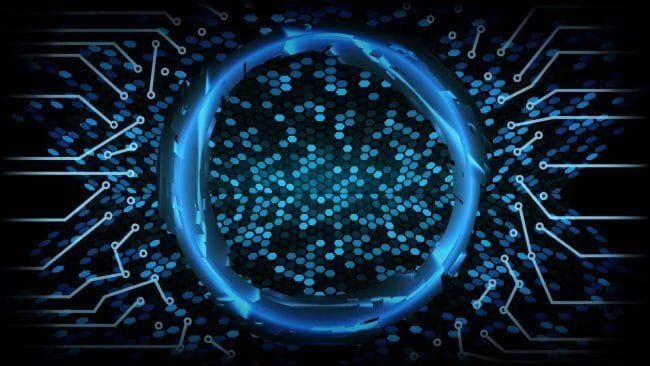
I love thinking about how technological advancement will intersect with our desires as humans.
My book on this topic is called The Real Internet of Things.
We have all these gadgets, technologies, and services, but towards what goal are they moving us? What’s the endgame? We see the features—like email and personal devices and various kinds of applications—but what’s the vision and story that brings it all together? That’s the piece that’s been missing.
I think the industry will soon figure out that the game is not producing a continuous supply of widgets and one-off services, but rather the holistic management of a customer’s life—centered around their core activities.
All the big tech companies will end up providing a complete, bundled Life Management System for their customers.
This isn’t the same as saying as a business—"Hey, we should really do something for people that like to exercise. Do we have any exercise intellectual property?" Or two quarters from then, saying, "Wow, we’re really getting killed in Education. We should have a learning app or something!"
Companies know they need to get into these various verticals, but most haven’t realized we’re ultimately talking about a Life Management System.
This type of thinking is still common because the tech industry is so new, and because most companies are so focused on next quarter’s (and next year’s) numbers. The piece that hasn’t happened yet is the realization that tech is for humans, and that the way to be successful long-term is to fully understand human life activities and workflows and then build a two, five, ten, and 20-year strategy around that.
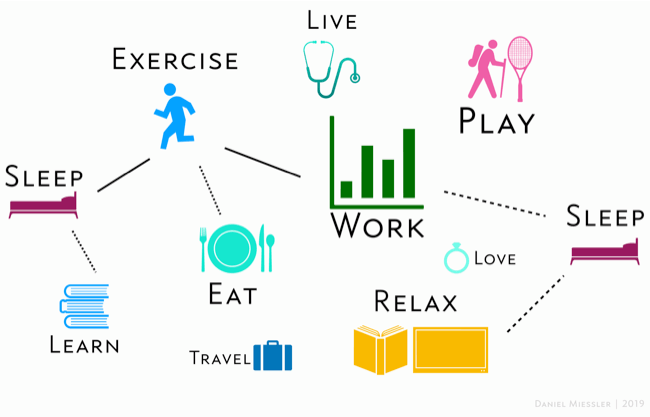
Life as a collection of essential and valued activities
Humans change at the evolutionary timescale, so evolution is ultimately the customer.
The thing is, people are remarkably predictable. We have goals, and we have workflows. And our goals are determined by processes deep within us that change on an extremely long time-scale. This is something I talked about in the opening chapter of The Real Internet of Things.
Specifically, instead of starting with tech and seeing where it’s going, I’m starting with humans and what they seek, need, and desire. In other words, I think we can predict the future of technology through a strong understanding of what humans ultimately want as a species.
So if you want to know the shape of water—which can take any shape—your strongest play is to study the shape of the potholes (and other containers) it’ll end up in.
The Real Internet of Things, 2017
The Real Internet of Things, 2017Humans are trying to win, becasue that’s what our DNA tells us to do. We want to be smart and attractive and productive and fulfilled and successful. We want to have a unique voice. We want to be creative. We want to be noticed.
And all of these are curation and optimization problems. You need to figure out the best foods to eat, when to eat them, how much of it to eat. You need to figure out the best way to spend your time. What’s the best show to watch? What’s the best way to learn how to make a new dish you had at a restaurant, or the best wine for a Game of Thrones watch party? Or the best gift for a friend?
Life is a constant stream of choices that we struggle to optimize to acheive our desired outcomes, and there is no higher calling for technology than helping us to manage those options holistically, across every dimension.
Another key for ecosystems will be knowing when to back off, because there is such a thing as too managed.
We’re talking about life optimization as a platform—from sleep, to eating, to learning, to working, to dating, to successful management of a family.
Ecosystem differentiation will offer lifestyle choice
This could also be called a Life Management System (LMS).
Choosing a Corporate Technology Ecosystem (CTE) will be much like choosing a religion, or a political party. There won’t be too many options, but the differences may be quite significant, and people will make their selection based on alignment with their life priorities.
Some of the key differences between ecosystems will be things like:
Aesthetic vs. utility
Functionality vs. anonymnity
Privacy vs. visibility
Personal assistant or life-line
Ecosystems will include safety, health, security, and privacy
CTEs will be holistic, meaning they will cover not just your work and leisure preferences and optimizations, but everyting to do with your security and safety. And that includes privacy.
Think about all the individual things you have to worry about today, as an individual, or especially as a parent. Health insurance, medicines, getting regular checkups, knowing quickly if someone gets hurt, making sure they get treated quickly, taking care of your parents as they age, dealing with legal matters.
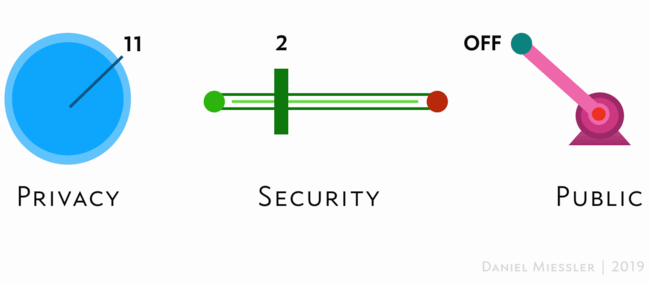
Ecosystems will differ in what they emphasize and value
These are all risk related, and for the most part they’re one-off items handled by different organinizations or different groups. It’s many different conversations, with many different entities, to try to sort it all out. Well, that’s the point of an ecosystem.
The Soviet Union thought full life management should (and would) come from the government, but this type of holistic service is much better suited to corporations who benefit by having you using as many of their services as possible.
Managed privacy
DeleteMe > is one such service that I’ve used in the past.
The privacy situation is especially interesting. Rather than ranting and chasing down various poeple who are stealing, selling, or otherwise misusing your and your family’s data, that will be included in these services. So instead of using some third party to go around deleting your data from places, or tracking down offenders, you’ll have a full corporate entity doing it on your behalf—using their giant team of privacy lawyers.
In order to get full use of the ecosystem, e.g., having doors open automatically, having your home automated, being able to buy things in a frictionless manner, etc.—this will require that your CTE has massive amounts of data about you. And that data will be collected in a continuous fashion.
Privacy doesn’t necessarily mean that nobody has your data, and in the future it’s going to mostly mean that only the right people have it.
But part of their service will be ensuring that only the right people have access to that data, in the right amount, and the right time. You’re simultaneously trusting your provider to have everything, but also enabling them to use all their resources to ensure that data doesn’t get out, and that it’s protected and used properly by everyone online.
So their job isn’t just using all of your data to make your life rich and productive—it’s also their job to make sure only that one ecosystem—along with vetted and trusted partners—can use it. And it’s up to them to keep it locked down.
The main ecosystem options
As with most such options—whether political or lifestyle in nature—the main two camps will be 1) curated, premium, and attractive…vs. 2) open, affordable, and ad-hoc—with one or two options that fall between or merge these in various ways.
The former types of ecosystem will be far more expensive, far more inclusive, far more premium, will be easier to use, will grant access to many higher-tier services, will invoke respect throughout the world, but will be more limited in your customization options.
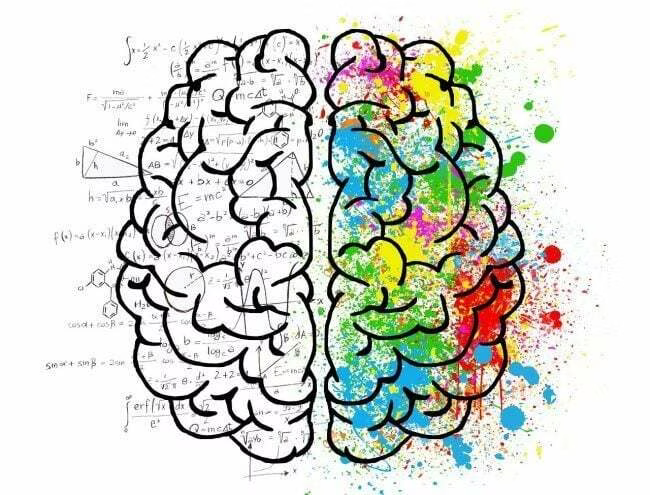
The latter types of ecosystem will be far more affordable, open to virtually everyone, will be less polished, won’t have as powerful of branding or eliteness assocated with them, but will be far more open and customizable in terms of how you can mix and match smaller services into the ecosystem.
There will also be distinct strong points for various offerings—likely based on the origin story for that particular bundle. Some might be work-based, or activity-based, or lifestyle-based, for example.
A day in a life in an ecosystem
Let’s take a brief look at the life of someone named Amir in 2032. He lives in San Francisco and works at a design company near the Ferry Building. Amir uses the Oracle Ecosystem, because he loves saving more based on how much he does, and becasue they have his favorite mix of media and travel options.
His Life Management System bundle with Oracle Empower includes:
IoT Home (Full Digital Assistant access to his home and shared friends’ homes)
IoT Vehicle (Full DA access to personal and shared vehicles)
Personal Authentication to City and National IoT infrastructure
TaxID (Noah does his taxes for him, backed by Oracle)
VoteID (When he goes into a voting both, Noah validates his identity, and walks him through his options using an approved issues tutorial)
Oracle Health Gold (Full, 100% health coverage with very high limits and no deductables. Once he has a video visit with an AI Nurse or his chosen doctor, they give him a prescription that gets delivered within 30 minutes or that he can pick up at any Oracle Walgreens. Also includes full AI health monitoring and recommendations through Noah, which is his just a personalized Oracle DA, so if anything ever looks dangerous he’s instantly connected to a doctor with EMS standing by.)
Oracle Fitness (his 24/7 personal trainer with access to all the best Peloton courses, personal instruction, and full Daemonized access to all Oracle 24/Hour Fitness Gyms Worldwide)
Oracle Sentinel (a Security and Privacy service that watches globally for signs that his data has been leaked or misused by any company, and responds with cleanups, cease and desists, lawsuits, etc. The system also constantly monitors the security settings for all his various digital and IoT assets.)
Oracle Scholar (Full digital access to the Top 350 worldwide universities’ courses, including live streaming events from the top professors and speakers in the world)
Amir wakes up to his alarm that selected the perfect time based on his sleep cycle.
His Digital Assistant (DA)—named Noah—shows him the weather, chance of rain, first meetings, and latest headlines on his full-wall display in his bedroom.
As he puts on his transparent glasses and watch, he gives his DA a full view of what he’s seeing.
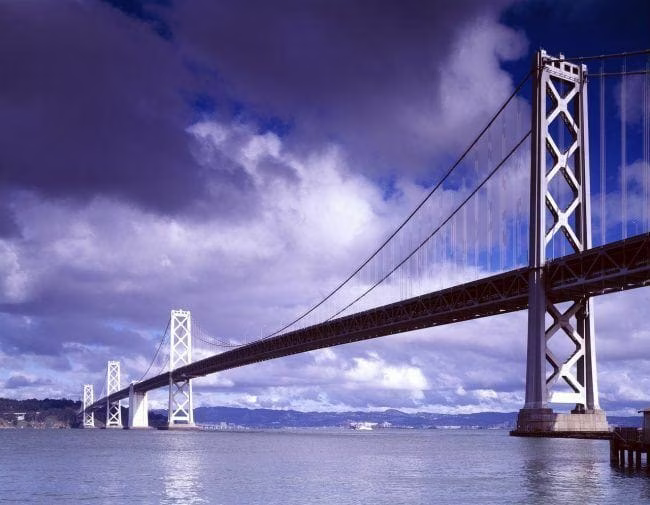
The DA will recognize most every object and scene in Amir’s view using experience extraction >.
As he eats his cereal, the calories are deducted from his total for the day based on the type of cereal he ate, how much, and the type of milk he used.
When he picks up his kettlebells, his DA asks him if he wants to do Kettlebells with someone else, and when he says yes it shows him a gym with an instructor doing a 10-minute kettlebell class.
Read more about continuous authentication >.
Upon finishing, his DA (Noah) reminds him, "The car will be ready downstairs in 6 minutes." He gets in and gets out without fiddling with an app because Noah handles everything through the car company’s API.
At work, everything works around him automatically, even things that require access or payment, because his DA stays authenticated to him continuously through various biometrics, so it’s doing things on his behalf.
While at work, he realizes he wants to send his girlfriend flowers, and he asks Noah to handle it. One of Noah’s jobs is to know the gift preferences of everyone Amir cares about, so he orders accordingly from api.flowers.com/order/, and then shows Amir what he ordered in his glasses.
When Amir takes a walk under the Bay Bridge after work, Noah chimes in and says, "You’re still favoring your right ankle. Do you want me to bring up Dr. Sarah on video?" Amir says yes, they have a brief video chat transparently in his glasses, and he pays nothing, and a girl on a one-wheeler hands him his prescription 7 minutes later while he’s under the bridge.
After his walk, Noah tells him that Steven Pinker is streaming a talk from Harvard in 3 minutes, and that he’ll background it in his glasses.
When he gets home his girlfriend is overjoyed because she just switched from the Oracle CTE to the one by Microsoft, and, "OMG, these features are so much better!!!"
When I watch something via any interface, it knows I’m an independent filmmaker, and it automatically imports the tools used by that director into my Creative Suite! Plus, I get a 2% Customized Meals discount when I make healthier choices, which are then recommended by my DA named Mindy!
Amir isn’t convinced yet, but it is nice to have the same CTE as the person you’re dating. He asks Noah to pull up the Microsoft Entourage teaser, which he does, but not without a slight delay and a bit of sadness in the voice.
Here you go, buddy.
Other advantages to companies offering an ecosystem
Other advantages to offering this kind of model include:
The book Subscribed is a great walkthrough of this transition.
Possible partnerships with governments to provide services that would have otherwise come from them. Perhaps in the form of tax breaks or subsities.
The ability to transition to a steady income source (or at least more steady than many others) in the form of a subscription-based model for all their products.
Summary
We’re so early in the introduction of technology into our personal lives that most companies are still just throwing products as fast as possible into the market in hope that something works.
Soon a transition will be made that puts the core human activities at the center of technological innovation in the consumer space, which will open the doors to the Corporate Technological Ecosystem (CTE).
CTEs will include everything people do in life, from sleep to exercise to work to play to dating to travel to healthcare to financial and family management. Everything that singles and families already do—but curated and optimized 24/7—all for a single monthly subscription.
I could be wrong, but I think this is a matter of when—not if.
What kind of ecosystem will you choose?
Notes
My friend Joel points out that it could be easy to compete with these bundles once they exist. I agree, but I think many will enjoy the curation and protection of an ecosystem. More cost savings through their various relationships, and protection from various types of abuse through their armies of lawyers. Another point is that the ubiquity of the digital assistants will depend on advantages that only a handful of companies will have.